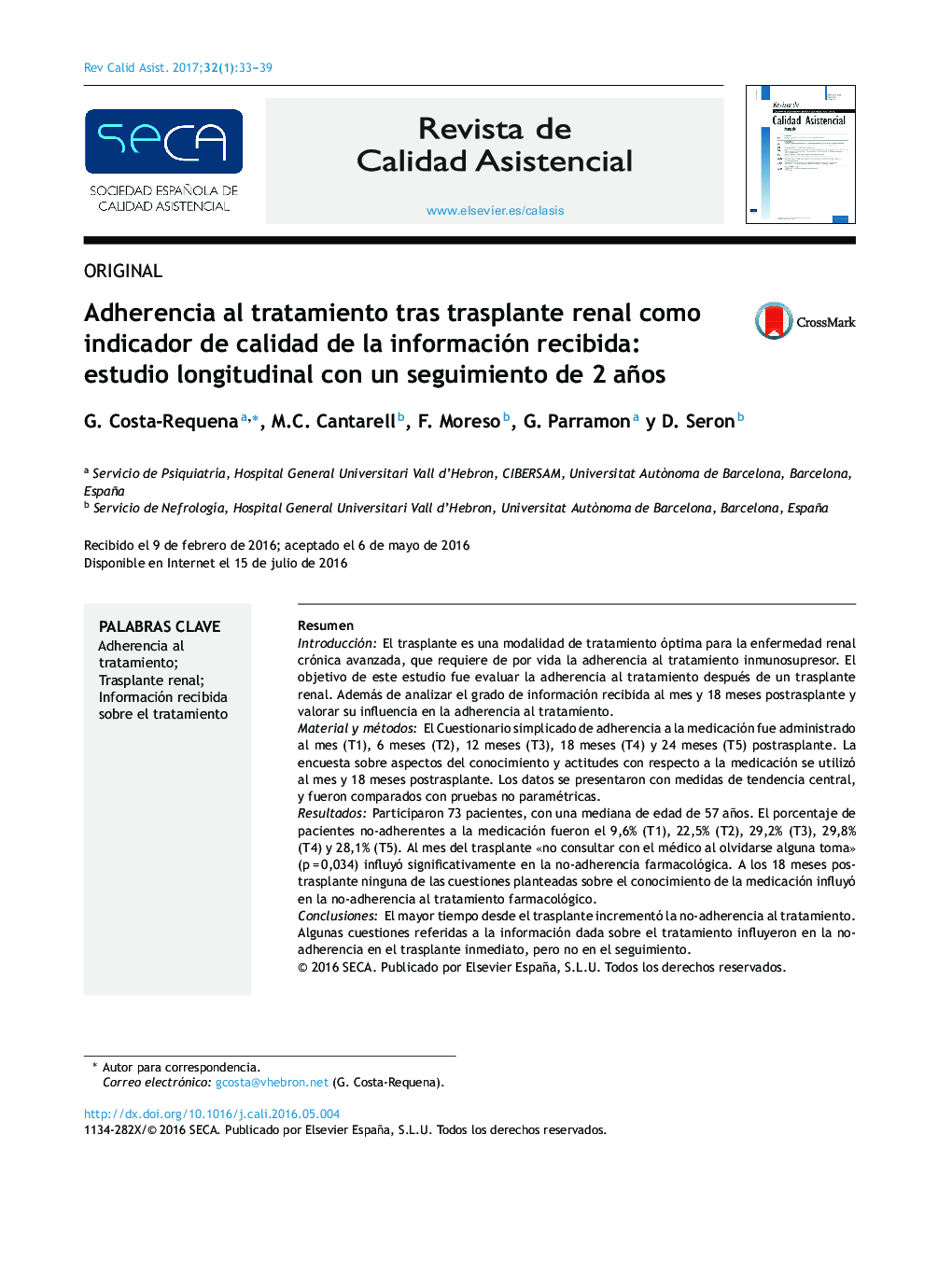| کد مقاله | کد نشریه | سال انتشار | مقاله انگلیسی | نسخه تمام متن |
|---|---|---|---|---|
| 5123189 | 1378372 | 2017 | 7 صفحه PDF | دانلود رایگان |

ResumenIntroducciónEl trasplante es una modalidad de tratamiento óptima para la enfermedad renal crónica avanzada, que requiere de por vida la adherencia al tratamiento inmunosupresor. El objetivo de este estudio fue evaluar la adherencia al tratamiento después de un trasplante renal. Además de analizar el grado de información recibida al mes y 18 meses postrasplante y valorar su influencia en la adherencia al tratamiento.Material y métodosEl Cuestionario simplicado de adherencia a la medicación fue administrado al mes (T1), 6 meses (T2), 12 meses (T3), 18 meses (T4) y 24 meses (T5) postrasplante. La encuesta sobre aspectos del conocimiento y actitudes con respecto a la medicación se utilizó al mes y 18 meses postrasplante. Los datos se presentaron con medidas de tendencia central, y fueron comparados con pruebas no paramétricas.ResultadosParticiparon 73 pacientes, con una mediana de edad de 57 años. El porcentaje de pacientes no-adherentes a la medicación fueron el 9,6% (T1), 22,5% (T2), 29,2% (T3), 29,8% (T4) y 28,1% (T5). Al mes del trasplante «no consultar con el médico al olvidarse alguna toma» (p = 0,034) influyó significativamente en la no-adherencia farmacológica. A los 18 meses postrasplante ninguna de las cuestiones planteadas sobre el conocimiento de la medicación influyó en la no-adherencia al tratamiento farmacológico.ConclusionesEl mayor tiempo desde el trasplante incrementó la no-adherencia al tratamiento. Algunas cuestiones referidas a la información dada sobre el tratamiento influyeron en la no-adherencia en el trasplante inmediato, pero no en el seguimiento.
IntroductionTransplantation is an optimal form of treatment for end-stage renal disease, but requires lifelong adherence to immunosuppressive therapy. The aim of this study was to longitudinally assess the adherence to treatment after kidney transplant, as well as to compare the amount of information about the treatment received at one month and 18 months post-transplantation, and its influence on adherence to treatment.Material and methodsThe Self-Reported Measure of Medication Adherence was administered at month (T1), 6 months (T2), 12 months (T3), 18 months (T4), and 24 months (T5) post-transplantation. Survey about aspects of knowledge and attitudes about medication, was administered at one month and 18 months post-transplant. Measures of central tendency and non-parametric tests were used to compare the data.ResultsThe study included a total of 73 patients with a median age of 57 years. The percentage of patients non-adherent to medication was 9.6% (T1), 22.5% (T2), 29.2% (T3), 29.8% (T4), and 28.1% (T5). One month after transplantation “not consulting with the doctor on forgetting to take medication (P=.034) significantly influenced the non-adherence to treatment. At 18 months post- transplantation, none of the issues raised on medication knowledge had an influence on non-adherence to treatment.ConclusionsLonger times since transplantation increased the non-adherence to treatment. Some issues regarding the information of treatment influenced the non-adherence in the immediate transplant period, but not in the follow-up.
Journal: Revista de Calidad Asistencial - Volume 32, Issue 1, JanuaryâFebruary 2017, Pages 33-39